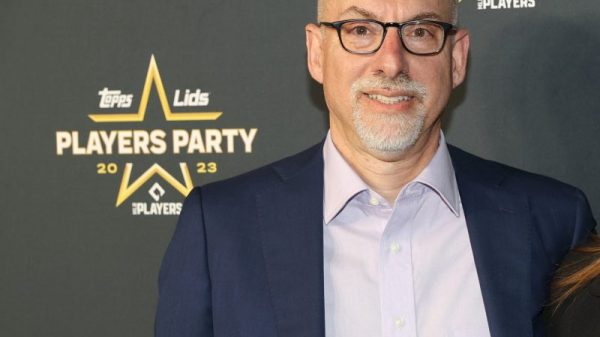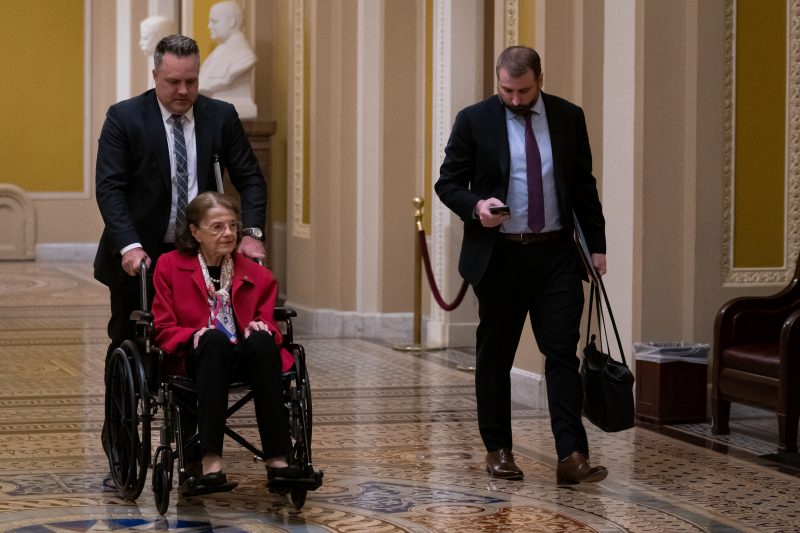In December 2009, the 92-year-old Democrat, unable to walk, got wheeled onto the Senate floor and provided the crucial vote to advance a landmark health care law. When he yelled “aye,” fellow Democrats stood and cheered.
Robert C. Byrd (D-W.Va.), the longest serving senator in history, never faced the public backlash that Sen. Dianne Feinstein (D-Calif.) now goes through as she battles a similar mental and physical decline. Byrd, who died in June 2010, received a hero’s welcome each time he arrived to the Senate to provide the crucial 60th vote to pass the Affordable Care Act.
These days, Feinstein, who also requires aides to wheel her about the Senate, faces jeers from a liberal activist base that wants her to resign now rather than serve out the end of her term next year. After a two-month absence slightly delayed consideration of a few of President Biden’s nominees in the 51-49 Senate, she returned May 10 with little fanfare.
Just Senate Majority Leader Charles E. Schumer (D-N.Y.) greeted her outside the Capitol and only a few colleagues were on hand when she cast her first vote after coming back from a brutal bout of shingles. There’s little public adulation each time Feinstein provides the swing vote in a Judiciary Committee that would otherwise deadlock at 10-10.
Many of her defenders call this a sexist double-standard, and they’re definitely right that Byrd, the late Sen. Edward M. Kennedy (D-Mass.) and other male senators who grew frail while in office never faced this type of public shaming.
But others say that the party’s coalition has shifted from the earliest days of Barack Obama’s presidency through the Trump era, with a much younger, professional set that expect to see their generation taking the reins of power just as they have in other industries.
These same younger Democrats who want Feinstein to step down now also tend to think President Biden, 80, should stand down from running for another term.
“In a world where we see so many of the most successful people — particularly in the tech world — literally in their 20s and 30s, I understand why,” said Sen. Mark R. Warner (D-Va.), who joined the Senate in 2009. “I’m not surprised in a world where instant return is what you expect on all of your devices and in all of your interactions with technology, that the desire for more instant change is high.”
Part of this change in attitude comes from younger Democrats watching this older generation hang on so long. In 2009 the Democratic president (Obama) was 48, the vice president (Biden) was 67, the Democratic House speaker (Rep. Nancy Pelosi) was 69.
By last year the president was about to turn 80 and the speaker was 82, with two other octogenarians as her longtime lieutenants. Senate Majority Leader Charles E. Schumer (D-N.Y.), a 42-year veteran of Congress, was a relative youngster in that crowd as he turned 72.
Feinstein was 84 when she announced her reelection bid in late 2017, for a term that will end when she’s 91 if she serves it out.
What does the younger generation see as its party’s top credential for leadership?
“Tenure, not talent,” Rep. Dean Phillips (D-Minn.) said.
Phillips, 54, first elected in 2018, caused a stir when he joined Rep. Ro Khanna, a 46-year-old Democrat representing Silicon Valley, in calling for Feinstein to resign. He also declined to endorse Biden’s 2024 reelection bid.
Phillips said Ruth Bader Ginsburg’s arc changed his view toward elderly Democrats hanging on well into their 80s. A feminist icon, the Supreme Court justice did not retire during Obama’s presidency despite multiple cancer battles. She died, at 87, in September 2020, allowing Trump to replace her with Justice Amy Coney Barrett, who provided the critical vote to overturn Roe v. Wade last year.
“Look at the result,” he said.
Donald Trump’s presidency served as the dividing line for some Democrats in their calls for passing the generational torch.
“I’m part of the class of what’s called the Trump babies. We all were motivated to run, or most of us were motivated to run, because Donald Trump surprised the world and got elected,” said Rep. Elissa Slotkin (D-Mich.), who was first elected in 2018.
Now running for the Senate, Slotkin talks to a handful of House Democrats also running for the Senate — all first elected in the Trump era — about collectively changing the upper chamber.
“We need a different vision of how to lead from the top, from a place like the Senate. I feel that very strongly, that there is substance we need to bring and also style,” Slotkin said.
Most Democratic senators have been publicly deferential to Feinstein and fully back Biden’s reelection. Sen. Brian Schatz (D-Hawaii), who was appointed in December 2012 to replace his state’s legendary senator, Daniel Inouye, who died at 88, said modern health advances have made it possible for leaders to serve at advanced ages.
“We have a president who’s got an incredible record, and you ask people, well, wouldn’t you like someone younger? And I think in the abstract people say, well, sure,” Schatz, 50, said. “But the reason he’s not getting a serious primary is because people generally think that he’s delivering on his promises. So, all they’ve got left is, isn’t that too old?”
Republicans, who are more reliant on older voters, have not had a similar generational clash. Polls show their primary voters have few qualms about Trump’s age (he would be 82 at the end of 2028) or his lack of a healthy diet.
Sen. Josh Hawley (R-Mo.) said that the former president’s MAGA agenda most clearly resonates with the younger generation of Republicans like himself, Sen. J.D. Vance (R-Ohio) and many in the House.
“The populists tend to be younger, not older, here,” Hawley, 43, said.
Senate Minority Leader Mitch McConnell (R-Ky.) turned 81 in February and two weeks later suffered a broken rib and concussion from a fall at a restaurant. He missed six weeks of action and has remained tentative in his balance since returning. On Wednesday, McConnell could not hear questions that two reporters asked at his weekly news conference.
No significant Republican has called for his resignation, neither from his leadership post nor the Senate.
Some Democrats say Feinstein is the victim of the media’s technological transformation into a 24/7 digital platform backed up by an ideological cable news ecosystem that more aggressively pokes and prods political elders.
“There were a lot of concerns when I came here about Robert Byrd, and they weren’t publicly expressed,” said Sen. Jeff Merkley (D-Ore.), who took office in 2009.
Byrd, Kennedy and the late Sen. Thad Cochran (R-Miss.) did not face photographers tracking them around the Capitol trying to get a less-than-flattering shot along with reporters shouting questions at them. This is nearly a daily occurrence for Feinstein, with those pictures and her confused responses instantly posted on social media.
“I didn’t see stories really about that,” Merkley recalled of aging senators in his early days in the Senate. “But we really have seen stories about Feinstein.”
Not only did the press not hound Byrd, we lionized him.
On Dec. 23, 2009, across the top of The Washington Post, we ran a massive profile of Byrd’s votes to advance the ACA. A tough, but somewhat regal-looking picture of him being wheeled into the Capitol dominate the top half of the newspaper.
“From Sen. Byrd, a spirited ‘Aye’,” the positive headline read. Despite his missing 40 percent of votes that year, Byrd’s colleagues told me that he “looks a lot better, he seems a lot better.”
The next day, in a prominently displayed story, the New York Times described Byrd’s “poignant ritual” of showing up to cast the critical votes.
On the final roll call, early Christmas Eve, Byrd gave his only public remarks of the ACA debate, referencing how Kennedy, who had died four months earlier, would not see his legislative priority enacted into law.
“Mr. President,” he said, “this is for my friend Ted Kennedy. Aye!”
Democrats slapped their desks in celebration. In today’s environment, Byrd would very likely have faced calls to retire rather than risk having a prolonged absence stymying Obama’s agenda.
Last month, two Senate Democrats — Ben Cardin of Maryland and Thomas R. Carper of Delaware — decided against seeking reelection to terms that would have taken them well into their 80s.
“You’ve been patient in waiting for me to get out of the way. I hope that you run,” Carper, 76, said he told Rep. Lisa Blunt Rochester (D). First elected in 2016, Blunt Rochester, 61, is expected to announce her campaign this month.
When he ran for reelection in 2018, Cardin was more physically sharp — “I was climbing mountains, I was skiing” — and he worried about how much he would decline by 2030 when that Senate term would end.
“It’s a personal decision. I made my decision, and age was certainly a factor,” Cardin, 79, said.
Schatz threaded the generational needle by saying it’s “probably a good thing” that Democrats are not reflexively “lionizing anyone who’s served for a long time,” while noting that the real measure is results.
“It’s time to retire when you can’t do the job. But if you can do the job and you’ve reached some numerical age, that shouldn’t be cause for automatic retirement,” he said. “It’s just something for voters and the candidate themselves to put in the mix.”



























